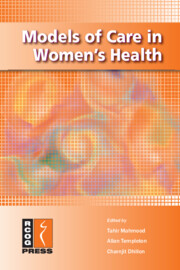Book contents
- Frontmatter
- Contents
- About the authors
- Abbreviations
- Preface
- CHAPTER 1 Setting the scene
- CHAPTER 2 Early pregnancy loss, including ectopic pregnancy and recurrent miscarriage
- CHAPTER 3 Infertility
- CHAPTER 4 Acute gynaecology
- CHAPTER 5 Sexual and reproductive health services
- CHAPTER 6 Termination of pregnancy
- CHAPTER 7 Heavy menstrual bleeding
- CHAPTER 8 Post-reproductive gynaecology
- CHAPTER 9 Urogynaecology
- CHAPTER 10 Vulval disease
- CHAPTER 11 Gynaecological oncology
- CHAPTER 12 Colposcopy services
- CHAPTER 13 Laparoscopic surgery
- CHAPTER 14 Gynaecological risk management
- CHAPTER 15 The role of the clinical director
- CHAPTER 16 Recommendations
- Index
CHAPTER 7 - Heavy menstrual bleeding
Published online by Cambridge University Press: 05 July 2014
- Frontmatter
- Contents
- About the authors
- Abbreviations
- Preface
- CHAPTER 1 Setting the scene
- CHAPTER 2 Early pregnancy loss, including ectopic pregnancy and recurrent miscarriage
- CHAPTER 3 Infertility
- CHAPTER 4 Acute gynaecology
- CHAPTER 5 Sexual and reproductive health services
- CHAPTER 6 Termination of pregnancy
- CHAPTER 7 Heavy menstrual bleeding
- CHAPTER 8 Post-reproductive gynaecology
- CHAPTER 9 Urogynaecology
- CHAPTER 10 Vulval disease
- CHAPTER 11 Gynaecological oncology
- CHAPTER 12 Colposcopy services
- CHAPTER 13 Laparoscopic surgery
- CHAPTER 14 Gynaecological risk management
- CHAPTER 15 The role of the clinical director
- CHAPTER 16 Recommendations
- Index
Summary
Key points
✓ Heavy menstrual bleeding interferes with a woman’s physical, social and emotional quality of life.
✓ National guidelines and standards have been produced by NICE and the RCOG. Services should be designed based on these standards to meet the public demand.
✓ There should be a dedicated, adequately equipped and staffed one-stop menstrual bleeding clinic.
✓ Although history, relevant examination, full blood count and ultrasound scan will constitute a thorough assessment, history alone is sufficient to initiate treatment in some women.
✓ The levonorgestrel-releasing intrauterine system is the first-line treatment of choice for women not wishing to conceive.
✓ Endometrial ablation or resection can be considered as a first-line treatment and the ability to perform it under local anaesthesia should be developed.
✓ A robust clinical governance framework should be in place to establish and maintain high-quality surgical, imaging, radiological and communication skills.
✓ Women should be able to access novel interventions, if appropriate. If lack of competence or resources are the issue, appropriate referral should be made.
✓ Quality control, health and safety issues and clinical risk management issues should be recognised, resolved and reported promptly.
✓ NICE has suggested several research recommendations in this important aspect of women’s health.
Introduction
For clinical purposes, heavy menstrual bleeding should be defined as excessive menstrual blood loss which interferes with the woman's physical, emotional, social and sexual quality of life and which can occur alone or in combination with other symptoms. Any interventions should aim to improve quality-of-life measures.
The service user's view
Women with heavy menstrual bleeding wish to have their problem taken seriously and to be part of the decision making process. They want information about all options for investigation and treatment. Many patient education websites on heavy menstrual bleeding contain an extensive analysis of available management options. The Healthcare Commission's survey programme 2004/05 on outpatient departments highlights the importance of cleanliness, discussion of the options for treatment, privacy and information on medicines. It also points out the value of informing women of ‘what to expect’ during and after the treatment in addition to the risks involved. Only the relevant tests should be carried out to avoid delays.
Keywords
- Type
- Chapter
- Information
- Models of Care in Women's Health , pp. 67 - 80Publisher: Cambridge University PressPrint publication year: 2009
- 1
- Cited by



